Global Business Environment: Impact on SASOL's Structure & Culture
VerifiedAdded on 2023/06/18
|11
|3751
|413
Report
AI Summary
This report examines the influence of the global business environment on organizational culture, functions, and structure, using SASOL Limited as a case study. It explores how operating in the international market affects organizational culture, governance, and leadership. The report assesses the impact of sustainable and ethical globalization, utilizing models like McKinsey 7s and Hofstede’s Cultural Dimensions to analyze organizational structure and culture. It evaluates different decision-making processes in a global context and identifies various routes to internationalization, including potential barriers and strategies to overcome them. The analysis covers strategic decision-making, risk management, and diversification in the global business environment, providing insights into how organizations can effectively navigate and thrive in the international market.
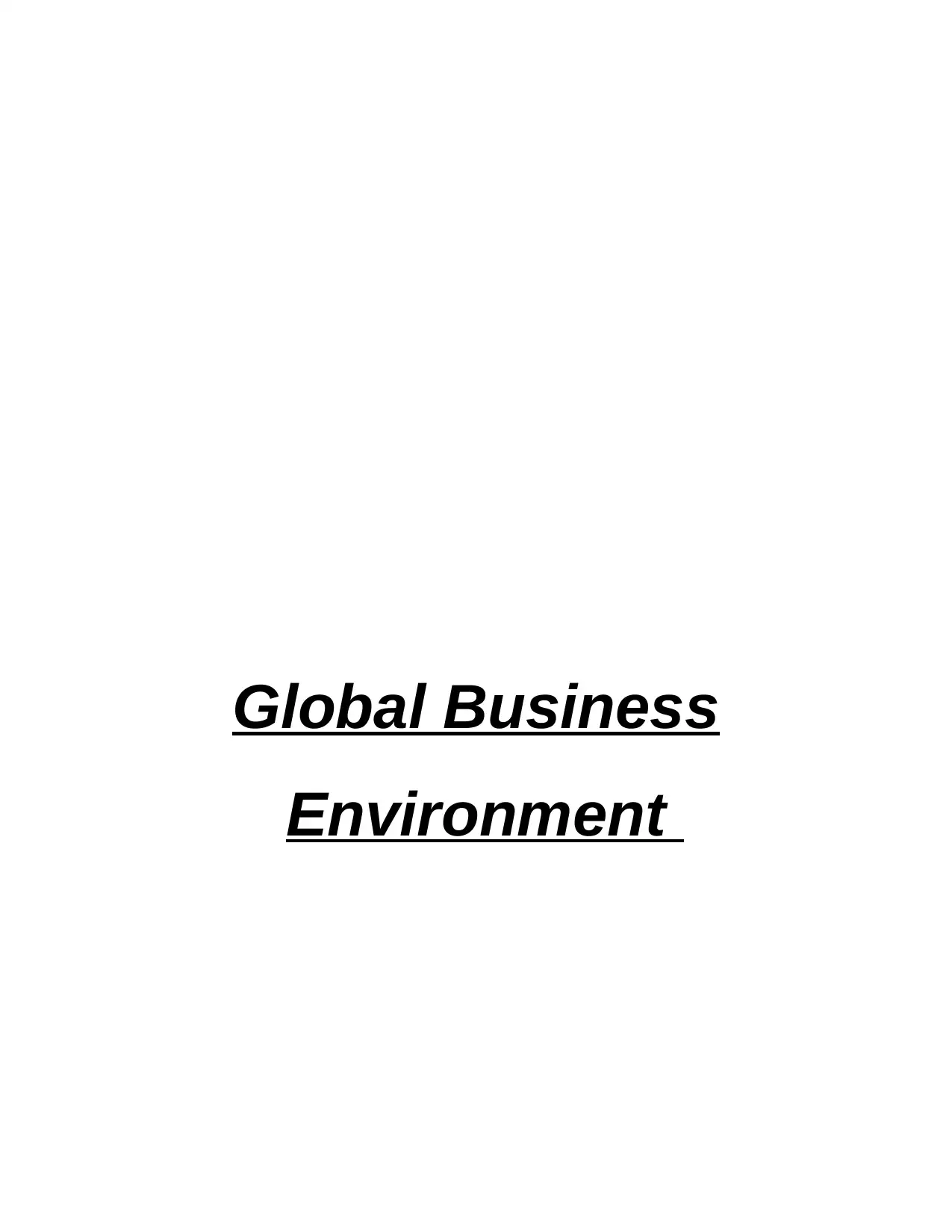
Global Business
Environment
Environment
Paraphrase This Document
Need a fresh take? Get an instant paraphrase of this document with our AI Paraphraser
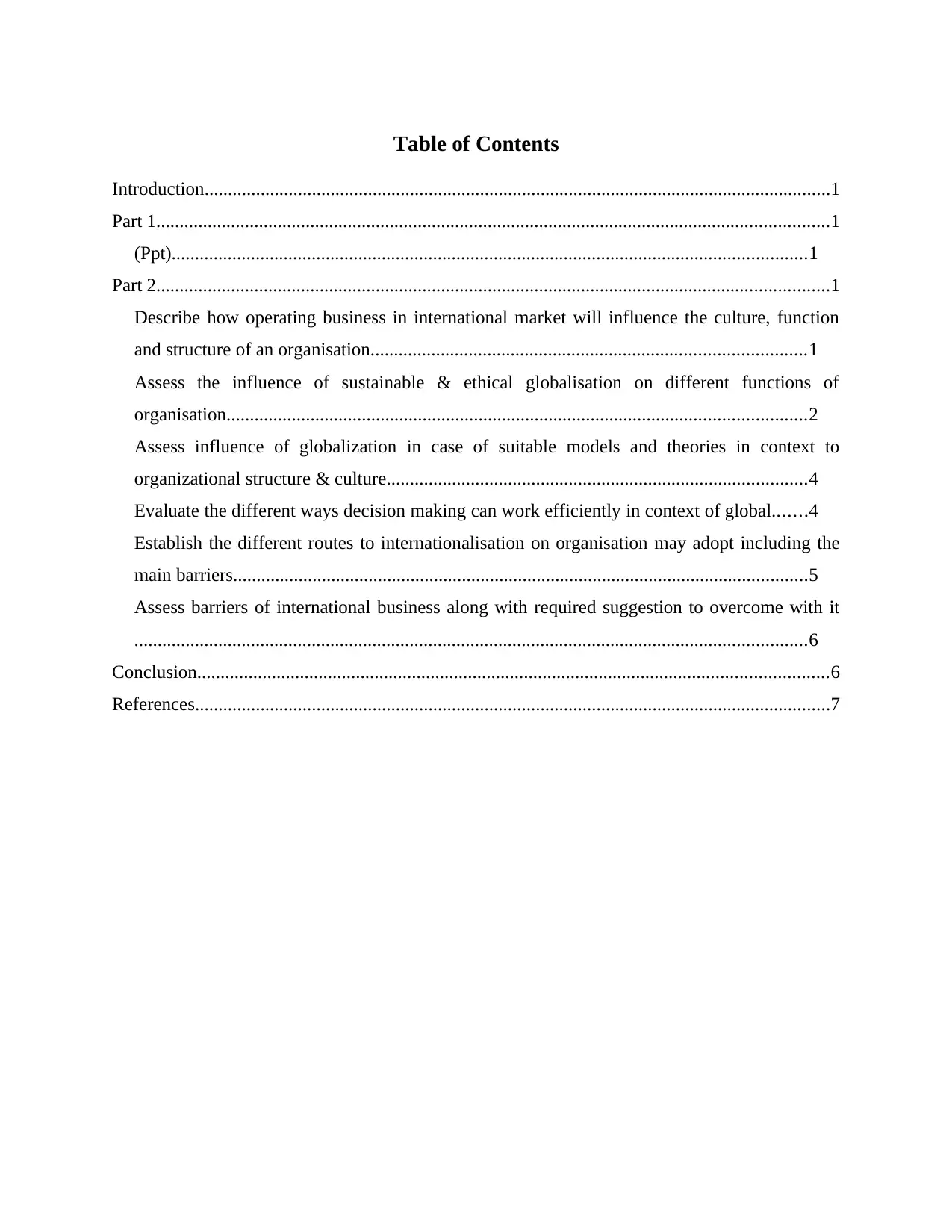
Table of Contents
Introduction......................................................................................................................................1
Part 1................................................................................................................................................1
(Ppt)........................................................................................................................................1
Part 2................................................................................................................................................1
Describe how operating business in international market will influence the culture, function
and structure of an organisation.............................................................................................1
Assess the influence of sustainable & ethical globalisation on different functions of
organisation............................................................................................................................2
Assess influence of globalization in case of suitable models and theories in context to
organizational structure & culture..........................................................................................4
Evaluate the different ways decision making can work efficiently in context of global.......4
Establish the different routes to internationalisation on organisation may adopt including the
main barriers...........................................................................................................................5
Assess barriers of international business along with required suggestion to overcome with it
................................................................................................................................................6
Conclusion.......................................................................................................................................6
References........................................................................................................................................7
Introduction......................................................................................................................................1
Part 1................................................................................................................................................1
(Ppt)........................................................................................................................................1
Part 2................................................................................................................................................1
Describe how operating business in international market will influence the culture, function
and structure of an organisation.............................................................................................1
Assess the influence of sustainable & ethical globalisation on different functions of
organisation............................................................................................................................2
Assess influence of globalization in case of suitable models and theories in context to
organizational structure & culture..........................................................................................4
Evaluate the different ways decision making can work efficiently in context of global.......4
Establish the different routes to internationalisation on organisation may adopt including the
main barriers...........................................................................................................................5
Assess barriers of international business along with required suggestion to overcome with it
................................................................................................................................................6
Conclusion.......................................................................................................................................6
References........................................................................................................................................7
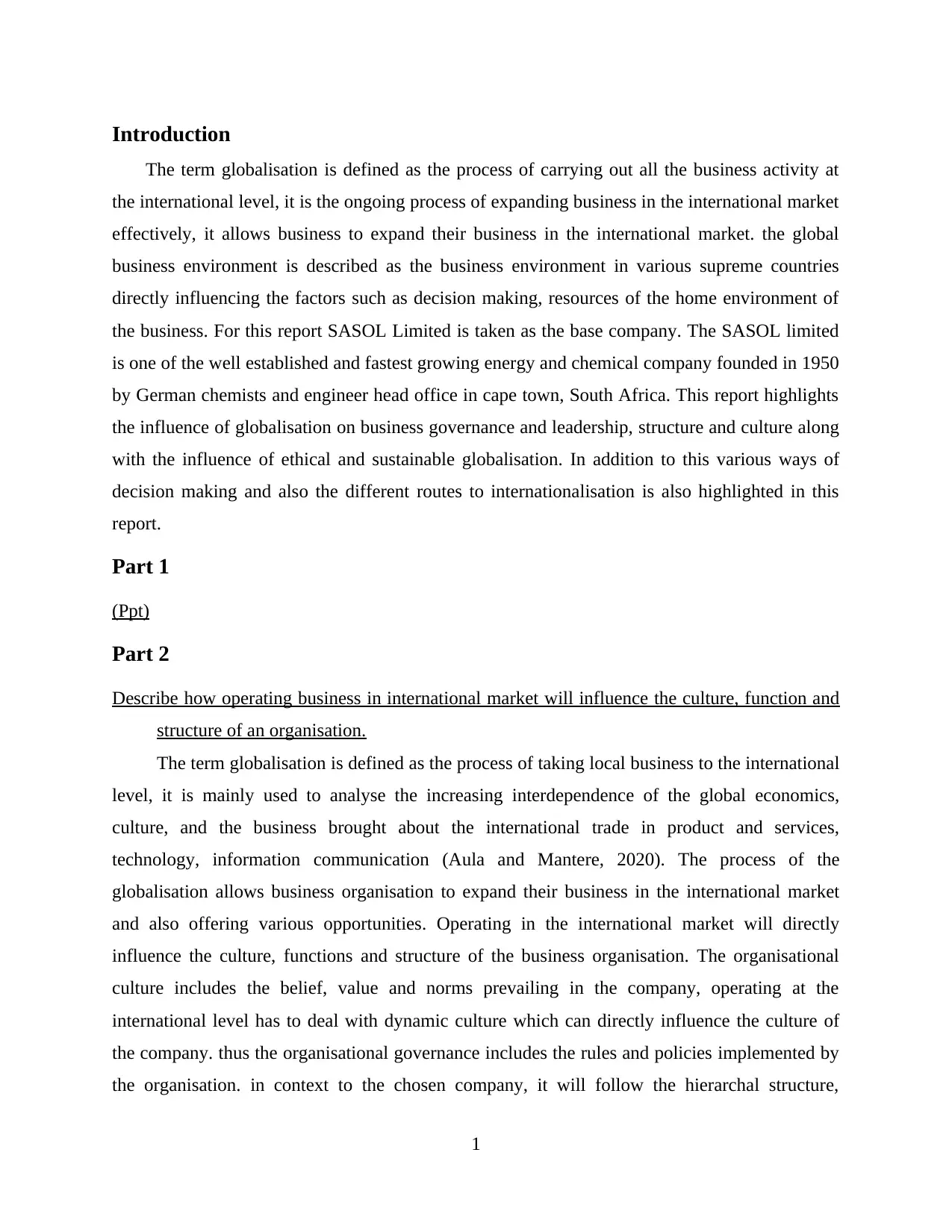
Introduction
The term globalisation is defined as the process of carrying out all the business activity at
the international level, it is the ongoing process of expanding business in the international market
effectively, it allows business to expand their business in the international market. the global
business environment is described as the business environment in various supreme countries
directly influencing the factors such as decision making, resources of the home environment of
the business. For this report SASOL Limited is taken as the base company. The SASOL limited
is one of the well established and fastest growing energy and chemical company founded in 1950
by German chemists and engineer head office in cape town, South Africa. This report highlights
the influence of globalisation on business governance and leadership, structure and culture along
with the influence of ethical and sustainable globalisation. In addition to this various ways of
decision making and also the different routes to internationalisation is also highlighted in this
report.
Part 1
(Ppt)
Part 2
Describe how operating business in international market will influence the culture, function and
structure of an organisation.
The term globalisation is defined as the process of taking local business to the international
level, it is mainly used to analyse the increasing interdependence of the global economics,
culture, and the business brought about the international trade in product and services,
technology, information communication (Aula and Mantere, 2020). The process of the
globalisation allows business organisation to expand their business in the international market
and also offering various opportunities. Operating in the international market will directly
influence the culture, functions and structure of the business organisation. The organisational
culture includes the belief, value and norms prevailing in the company, operating at the
international level has to deal with dynamic culture which can directly influence the culture of
the company. thus the organisational governance includes the rules and policies implemented by
the organisation. in context to the chosen company, it will follow the hierarchal structure,
1
The term globalisation is defined as the process of carrying out all the business activity at
the international level, it is the ongoing process of expanding business in the international market
effectively, it allows business to expand their business in the international market. the global
business environment is described as the business environment in various supreme countries
directly influencing the factors such as decision making, resources of the home environment of
the business. For this report SASOL Limited is taken as the base company. The SASOL limited
is one of the well established and fastest growing energy and chemical company founded in 1950
by German chemists and engineer head office in cape town, South Africa. This report highlights
the influence of globalisation on business governance and leadership, structure and culture along
with the influence of ethical and sustainable globalisation. In addition to this various ways of
decision making and also the different routes to internationalisation is also highlighted in this
report.
Part 1
(Ppt)
Part 2
Describe how operating business in international market will influence the culture, function and
structure of an organisation.
The term globalisation is defined as the process of taking local business to the international
level, it is mainly used to analyse the increasing interdependence of the global economics,
culture, and the business brought about the international trade in product and services,
technology, information communication (Aula and Mantere, 2020). The process of the
globalisation allows business organisation to expand their business in the international market
and also offering various opportunities. Operating in the international market will directly
influence the culture, functions and structure of the business organisation. The organisational
culture includes the belief, value and norms prevailing in the company, operating at the
international level has to deal with dynamic culture which can directly influence the culture of
the company. thus the organisational governance includes the rules and policies implemented by
the organisation. in context to the chosen company, it will follow the hierarchal structure,
1
⊘ This is a preview!⊘
Do you want full access?
Subscribe today to unlock all pages.

Trusted by 1+ million students worldwide
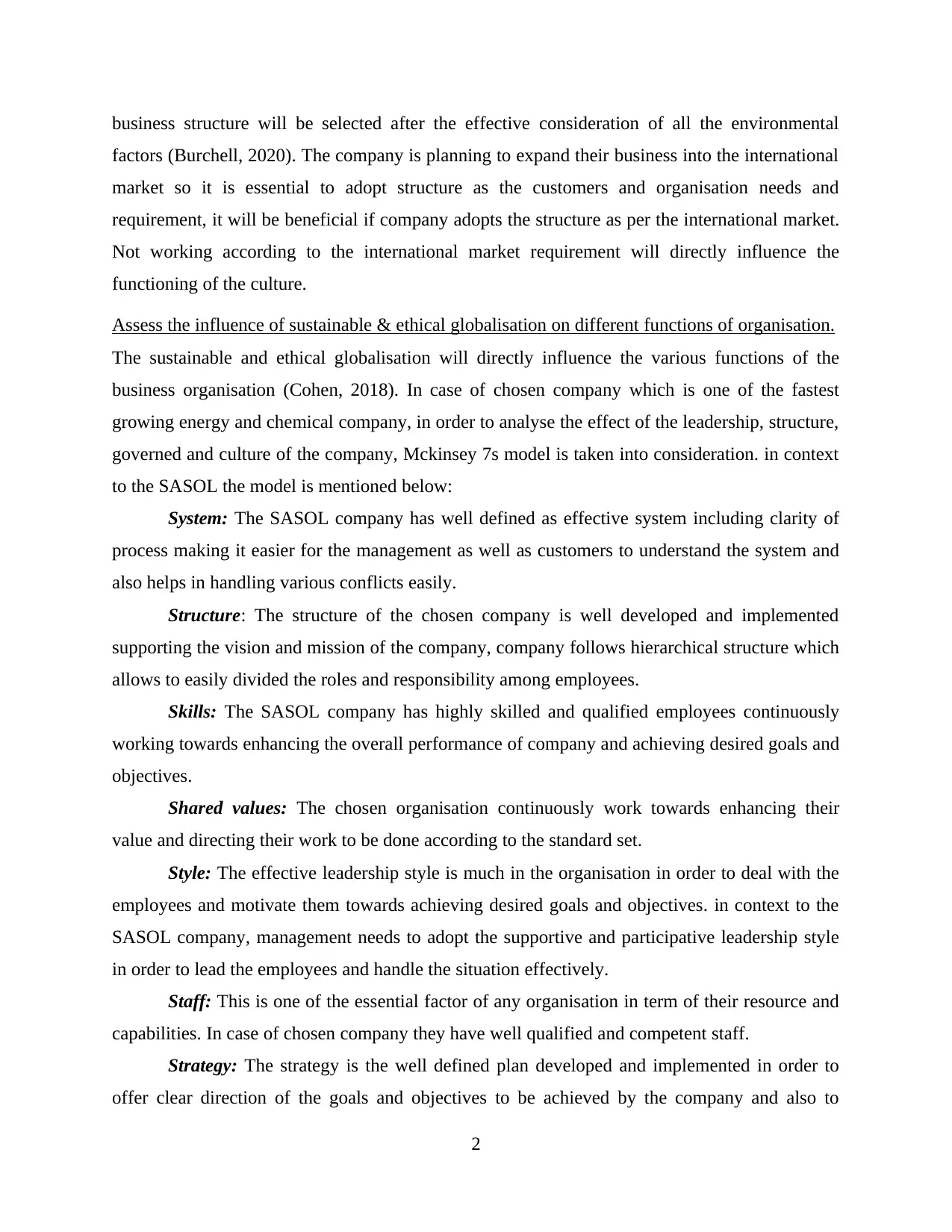
business structure will be selected after the effective consideration of all the environmental
factors (Burchell, 2020). The company is planning to expand their business into the international
market so it is essential to adopt structure as the customers and organisation needs and
requirement, it will be beneficial if company adopts the structure as per the international market.
Not working according to the international market requirement will directly influence the
functioning of the culture.
Assess the influence of sustainable & ethical globalisation on different functions of organisation.
The sustainable and ethical globalisation will directly influence the various functions of the
business organisation (Cohen, 2018). In case of chosen company which is one of the fastest
growing energy and chemical company, in order to analyse the effect of the leadership, structure,
governed and culture of the company, Mckinsey 7s model is taken into consideration. in context
to the SASOL the model is mentioned below:
System: The SASOL company has well defined as effective system including clarity of
process making it easier for the management as well as customers to understand the system and
also helps in handling various conflicts easily.
Structure: The structure of the chosen company is well developed and implemented
supporting the vision and mission of the company, company follows hierarchical structure which
allows to easily divided the roles and responsibility among employees.
Skills: The SASOL company has highly skilled and qualified employees continuously
working towards enhancing the overall performance of company and achieving desired goals and
objectives.
Shared values: The chosen organisation continuously work towards enhancing their
value and directing their work to be done according to the standard set.
Style: The effective leadership style is much in the organisation in order to deal with the
employees and motivate them towards achieving desired goals and objectives. in context to the
SASOL company, management needs to adopt the supportive and participative leadership style
in order to lead the employees and handle the situation effectively.
Staff: This is one of the essential factor of any organisation in term of their resource and
capabilities. In case of chosen company they have well qualified and competent staff.
Strategy: The strategy is the well defined plan developed and implemented in order to
offer clear direction of the goals and objectives to be achieved by the company and also to
2
factors (Burchell, 2020). The company is planning to expand their business into the international
market so it is essential to adopt structure as the customers and organisation needs and
requirement, it will be beneficial if company adopts the structure as per the international market.
Not working according to the international market requirement will directly influence the
functioning of the culture.
Assess the influence of sustainable & ethical globalisation on different functions of organisation.
The sustainable and ethical globalisation will directly influence the various functions of the
business organisation (Cohen, 2018). In case of chosen company which is one of the fastest
growing energy and chemical company, in order to analyse the effect of the leadership, structure,
governed and culture of the company, Mckinsey 7s model is taken into consideration. in context
to the SASOL the model is mentioned below:
System: The SASOL company has well defined as effective system including clarity of
process making it easier for the management as well as customers to understand the system and
also helps in handling various conflicts easily.
Structure: The structure of the chosen company is well developed and implemented
supporting the vision and mission of the company, company follows hierarchical structure which
allows to easily divided the roles and responsibility among employees.
Skills: The SASOL company has highly skilled and qualified employees continuously
working towards enhancing the overall performance of company and achieving desired goals and
objectives.
Shared values: The chosen organisation continuously work towards enhancing their
value and directing their work to be done according to the standard set.
Style: The effective leadership style is much in the organisation in order to deal with the
employees and motivate them towards achieving desired goals and objectives. in context to the
SASOL company, management needs to adopt the supportive and participative leadership style
in order to lead the employees and handle the situation effectively.
Staff: This is one of the essential factor of any organisation in term of their resource and
capabilities. In case of chosen company they have well qualified and competent staff.
Strategy: The strategy is the well defined plan developed and implemented in order to
offer clear direction of the goals and objectives to be achieved by the company and also to
2
Paraphrase This Document
Need a fresh take? Get an instant paraphrase of this document with our AI Paraphraser
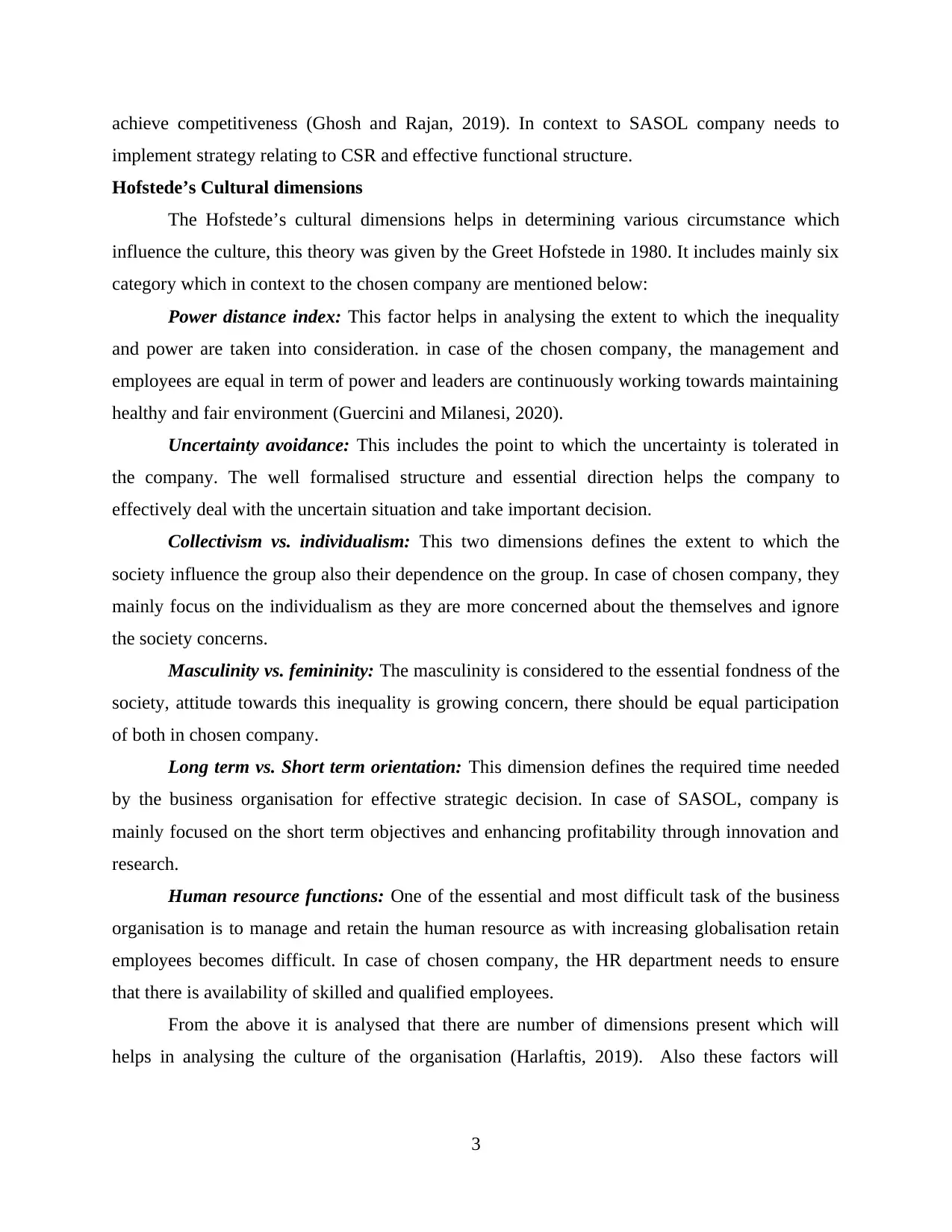
achieve competitiveness (Ghosh and Rajan, 2019). In context to SASOL company needs to
implement strategy relating to CSR and effective functional structure.
Hofstede’s Cultural dimensions
The Hofstede’s cultural dimensions helps in determining various circumstance which
influence the culture, this theory was given by the Greet Hofstede in 1980. It includes mainly six
category which in context to the chosen company are mentioned below:
Power distance index: This factor helps in analysing the extent to which the inequality
and power are taken into consideration. in case of the chosen company, the management and
employees are equal in term of power and leaders are continuously working towards maintaining
healthy and fair environment (Guercini and Milanesi, 2020).
Uncertainty avoidance: This includes the point to which the uncertainty is tolerated in
the company. The well formalised structure and essential direction helps the company to
effectively deal with the uncertain situation and take important decision.
Collectivism vs. individualism: This two dimensions defines the extent to which the
society influence the group also their dependence on the group. In case of chosen company, they
mainly focus on the individualism as they are more concerned about the themselves and ignore
the society concerns.
Masculinity vs. femininity: The masculinity is considered to the essential fondness of the
society, attitude towards this inequality is growing concern, there should be equal participation
of both in chosen company.
Long term vs. Short term orientation: This dimension defines the required time needed
by the business organisation for effective strategic decision. In case of SASOL, company is
mainly focused on the short term objectives and enhancing profitability through innovation and
research.
Human resource functions: One of the essential and most difficult task of the business
organisation is to manage and retain the human resource as with increasing globalisation retain
employees becomes difficult. In case of chosen company, the HR department needs to ensure
that there is availability of skilled and qualified employees.
From the above it is analysed that there are number of dimensions present which will
helps in analysing the culture of the organisation (Harlaftis, 2019). Also these factors will
3
implement strategy relating to CSR and effective functional structure.
Hofstede’s Cultural dimensions
The Hofstede’s cultural dimensions helps in determining various circumstance which
influence the culture, this theory was given by the Greet Hofstede in 1980. It includes mainly six
category which in context to the chosen company are mentioned below:
Power distance index: This factor helps in analysing the extent to which the inequality
and power are taken into consideration. in case of the chosen company, the management and
employees are equal in term of power and leaders are continuously working towards maintaining
healthy and fair environment (Guercini and Milanesi, 2020).
Uncertainty avoidance: This includes the point to which the uncertainty is tolerated in
the company. The well formalised structure and essential direction helps the company to
effectively deal with the uncertain situation and take important decision.
Collectivism vs. individualism: This two dimensions defines the extent to which the
society influence the group also their dependence on the group. In case of chosen company, they
mainly focus on the individualism as they are more concerned about the themselves and ignore
the society concerns.
Masculinity vs. femininity: The masculinity is considered to the essential fondness of the
society, attitude towards this inequality is growing concern, there should be equal participation
of both in chosen company.
Long term vs. Short term orientation: This dimension defines the required time needed
by the business organisation for effective strategic decision. In case of SASOL, company is
mainly focused on the short term objectives and enhancing profitability through innovation and
research.
Human resource functions: One of the essential and most difficult task of the business
organisation is to manage and retain the human resource as with increasing globalisation retain
employees becomes difficult. In case of chosen company, the HR department needs to ensure
that there is availability of skilled and qualified employees.
From the above it is analysed that there are number of dimensions present which will
helps in analysing the culture of the organisation (Harlaftis, 2019). Also these factors will
3
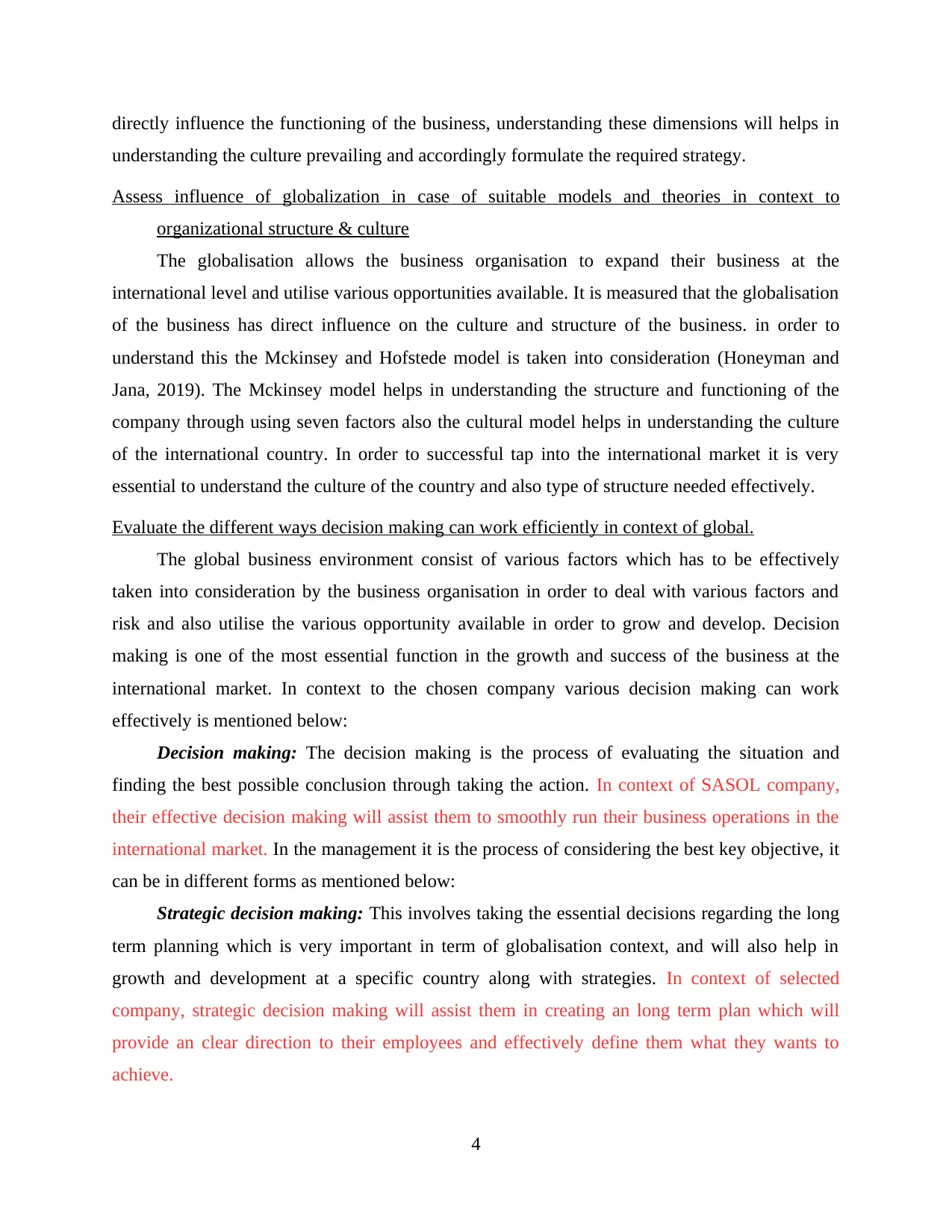
directly influence the functioning of the business, understanding these dimensions will helps in
understanding the culture prevailing and accordingly formulate the required strategy.
Assess influence of globalization in case of suitable models and theories in context to
organizational structure & culture
The globalisation allows the business organisation to expand their business at the
international level and utilise various opportunities available. It is measured that the globalisation
of the business has direct influence on the culture and structure of the business. in order to
understand this the Mckinsey and Hofstede model is taken into consideration (Honeyman and
Jana, 2019). The Mckinsey model helps in understanding the structure and functioning of the
company through using seven factors also the cultural model helps in understanding the culture
of the international country. In order to successful tap into the international market it is very
essential to understand the culture of the country and also type of structure needed effectively.
Evaluate the different ways decision making can work efficiently in context of global.
The global business environment consist of various factors which has to be effectively
taken into consideration by the business organisation in order to deal with various factors and
risk and also utilise the various opportunity available in order to grow and develop. Decision
making is one of the most essential function in the growth and success of the business at the
international market. In context to the chosen company various decision making can work
effectively is mentioned below:
Decision making: The decision making is the process of evaluating the situation and
finding the best possible conclusion through taking the action. In context of SASOL company,
their effective decision making will assist them to smoothly run their business operations in the
international market. In the management it is the process of considering the best key objective, it
can be in different forms as mentioned below:
Strategic decision making: This involves taking the essential decisions regarding the long
term planning which is very important in term of globalisation context, and will also help in
growth and development at a specific country along with strategies. In context of selected
company, strategic decision making will assist them in creating an long term plan which will
provide an clear direction to their employees and effectively define them what they wants to
achieve.
4
understanding the culture prevailing and accordingly formulate the required strategy.
Assess influence of globalization in case of suitable models and theories in context to
organizational structure & culture
The globalisation allows the business organisation to expand their business at the
international level and utilise various opportunities available. It is measured that the globalisation
of the business has direct influence on the culture and structure of the business. in order to
understand this the Mckinsey and Hofstede model is taken into consideration (Honeyman and
Jana, 2019). The Mckinsey model helps in understanding the structure and functioning of the
company through using seven factors also the cultural model helps in understanding the culture
of the international country. In order to successful tap into the international market it is very
essential to understand the culture of the country and also type of structure needed effectively.
Evaluate the different ways decision making can work efficiently in context of global.
The global business environment consist of various factors which has to be effectively
taken into consideration by the business organisation in order to deal with various factors and
risk and also utilise the various opportunity available in order to grow and develop. Decision
making is one of the most essential function in the growth and success of the business at the
international market. In context to the chosen company various decision making can work
effectively is mentioned below:
Decision making: The decision making is the process of evaluating the situation and
finding the best possible conclusion through taking the action. In context of SASOL company,
their effective decision making will assist them to smoothly run their business operations in the
international market. In the management it is the process of considering the best key objective, it
can be in different forms as mentioned below:
Strategic decision making: This involves taking the essential decisions regarding the long
term planning which is very important in term of globalisation context, and will also help in
growth and development at a specific country along with strategies. In context of selected
company, strategic decision making will assist them in creating an long term plan which will
provide an clear direction to their employees and effectively define them what they wants to
achieve.
4
⊘ This is a preview!⊘
Do you want full access?
Subscribe today to unlock all pages.

Trusted by 1+ million students worldwide
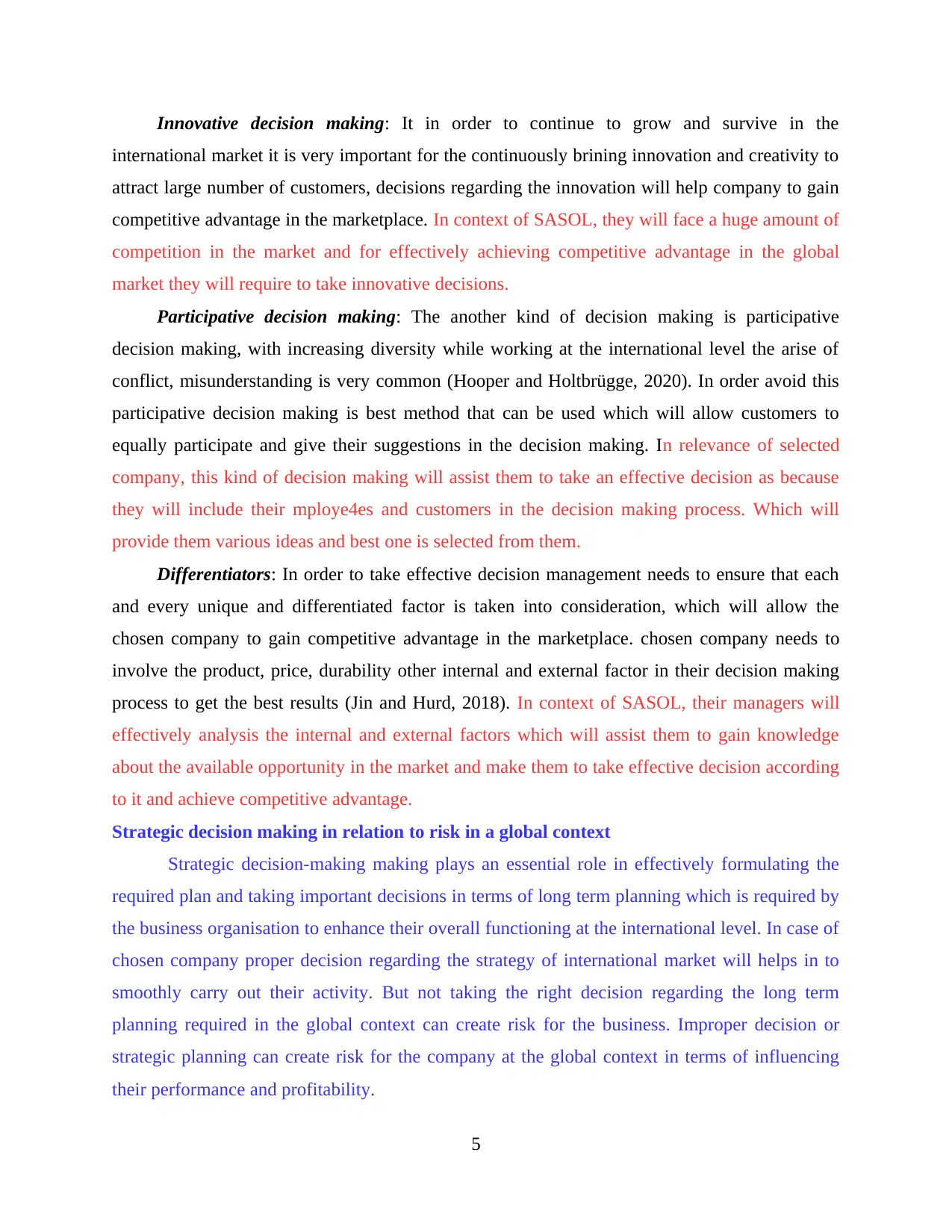
Innovative decision making: It in order to continue to grow and survive in the
international market it is very important for the continuously brining innovation and creativity to
attract large number of customers, decisions regarding the innovation will help company to gain
competitive advantage in the marketplace. In context of SASOL, they will face a huge amount of
competition in the market and for effectively achieving competitive advantage in the global
market they will require to take innovative decisions.
Participative decision making: The another kind of decision making is participative
decision making, with increasing diversity while working at the international level the arise of
conflict, misunderstanding is very common (Hooper and Holtbrügge, 2020). In order avoid this
participative decision making is best method that can be used which will allow customers to
equally participate and give their suggestions in the decision making. In relevance of selected
company, this kind of decision making will assist them to take an effective decision as because
they will include their mploye4es and customers in the decision making process. Which will
provide them various ideas and best one is selected from them.
Differentiators: In order to take effective decision management needs to ensure that each
and every unique and differentiated factor is taken into consideration, which will allow the
chosen company to gain competitive advantage in the marketplace. chosen company needs to
involve the product, price, durability other internal and external factor in their decision making
process to get the best results (Jin and Hurd, 2018). In context of SASOL, their managers will
effectively analysis the internal and external factors which will assist them to gain knowledge
about the available opportunity in the market and make them to take effective decision according
to it and achieve competitive advantage.
Strategic decision making in relation to risk in a global context
Strategic decision-making making plays an essential role in effectively formulating the
required plan and taking important decisions in terms of long term planning which is required by
the business organisation to enhance their overall functioning at the international level. In case of
chosen company proper decision regarding the strategy of international market will helps in to
smoothly carry out their activity. But not taking the right decision regarding the long term
planning required in the global context can create risk for the business. Improper decision or
strategic planning can create risk for the company at the global context in terms of influencing
their performance and profitability.
5
international market it is very important for the continuously brining innovation and creativity to
attract large number of customers, decisions regarding the innovation will help company to gain
competitive advantage in the marketplace. In context of SASOL, they will face a huge amount of
competition in the market and for effectively achieving competitive advantage in the global
market they will require to take innovative decisions.
Participative decision making: The another kind of decision making is participative
decision making, with increasing diversity while working at the international level the arise of
conflict, misunderstanding is very common (Hooper and Holtbrügge, 2020). In order avoid this
participative decision making is best method that can be used which will allow customers to
equally participate and give their suggestions in the decision making. In relevance of selected
company, this kind of decision making will assist them to take an effective decision as because
they will include their mploye4es and customers in the decision making process. Which will
provide them various ideas and best one is selected from them.
Differentiators: In order to take effective decision management needs to ensure that each
and every unique and differentiated factor is taken into consideration, which will allow the
chosen company to gain competitive advantage in the marketplace. chosen company needs to
involve the product, price, durability other internal and external factor in their decision making
process to get the best results (Jin and Hurd, 2018). In context of SASOL, their managers will
effectively analysis the internal and external factors which will assist them to gain knowledge
about the available opportunity in the market and make them to take effective decision according
to it and achieve competitive advantage.
Strategic decision making in relation to risk in a global context
Strategic decision-making making plays an essential role in effectively formulating the
required plan and taking important decisions in terms of long term planning which is required by
the business organisation to enhance their overall functioning at the international level. In case of
chosen company proper decision regarding the strategy of international market will helps in to
smoothly carry out their activity. But not taking the right decision regarding the long term
planning required in the global context can create risk for the business. Improper decision or
strategic planning can create risk for the company at the global context in terms of influencing
their performance and profitability.
5
Paraphrase This Document
Need a fresh take? Get an instant paraphrase of this document with our AI Paraphraser
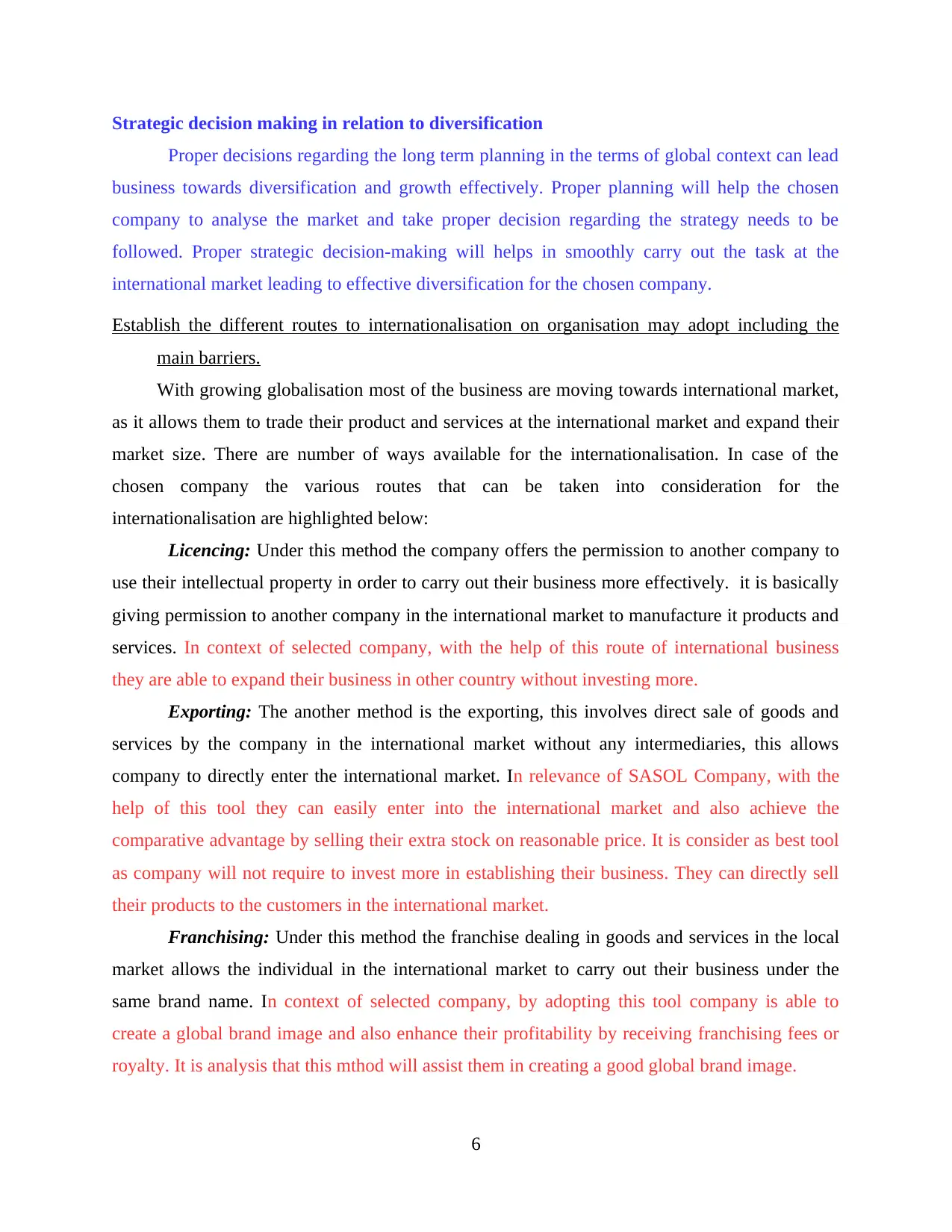
Strategic decision making in relation to diversification
Proper decisions regarding the long term planning in the terms of global context can lead
business towards diversification and growth effectively. Proper planning will help the chosen
company to analyse the market and take proper decision regarding the strategy needs to be
followed. Proper strategic decision-making will helps in smoothly carry out the task at the
international market leading to effective diversification for the chosen company.
Establish the different routes to internationalisation on organisation may adopt including the
main barriers.
With growing globalisation most of the business are moving towards international market,
as it allows them to trade their product and services at the international market and expand their
market size. There are number of ways available for the internationalisation. In case of the
chosen company the various routes that can be taken into consideration for the
internationalisation are highlighted below:
Licencing: Under this method the company offers the permission to another company to
use their intellectual property in order to carry out their business more effectively. it is basically
giving permission to another company in the international market to manufacture it products and
services. In context of selected company, with the help of this route of international business
they are able to expand their business in other country without investing more.
Exporting: The another method is the exporting, this involves direct sale of goods and
services by the company in the international market without any intermediaries, this allows
company to directly enter the international market. In relevance of SASOL Company, with the
help of this tool they can easily enter into the international market and also achieve the
comparative advantage by selling their extra stock on reasonable price. It is consider as best tool
as company will not require to invest more in establishing their business. They can directly sell
their products to the customers in the international market.
Franchising: Under this method the franchise dealing in goods and services in the local
market allows the individual in the international market to carry out their business under the
same brand name. In context of selected company, by adopting this tool company is able to
create a global brand image and also enhance their profitability by receiving franchising fees or
royalty. It is analysis that this mthod will assist them in creating a good global brand image.
6
Proper decisions regarding the long term planning in the terms of global context can lead
business towards diversification and growth effectively. Proper planning will help the chosen
company to analyse the market and take proper decision regarding the strategy needs to be
followed. Proper strategic decision-making will helps in smoothly carry out the task at the
international market leading to effective diversification for the chosen company.
Establish the different routes to internationalisation on organisation may adopt including the
main barriers.
With growing globalisation most of the business are moving towards international market,
as it allows them to trade their product and services at the international market and expand their
market size. There are number of ways available for the internationalisation. In case of the
chosen company the various routes that can be taken into consideration for the
internationalisation are highlighted below:
Licencing: Under this method the company offers the permission to another company to
use their intellectual property in order to carry out their business more effectively. it is basically
giving permission to another company in the international market to manufacture it products and
services. In context of selected company, with the help of this route of international business
they are able to expand their business in other country without investing more.
Exporting: The another method is the exporting, this involves direct sale of goods and
services by the company in the international market without any intermediaries, this allows
company to directly enter the international market. In relevance of SASOL Company, with the
help of this tool they can easily enter into the international market and also achieve the
comparative advantage by selling their extra stock on reasonable price. It is consider as best tool
as company will not require to invest more in establishing their business. They can directly sell
their products to the customers in the international market.
Franchising: Under this method the franchise dealing in goods and services in the local
market allows the individual in the international market to carry out their business under the
same brand name. In context of selected company, by adopting this tool company is able to
create a global brand image and also enhance their profitability by receiving franchising fees or
royalty. It is analysis that this mthod will assist them in creating a good global brand image.
6
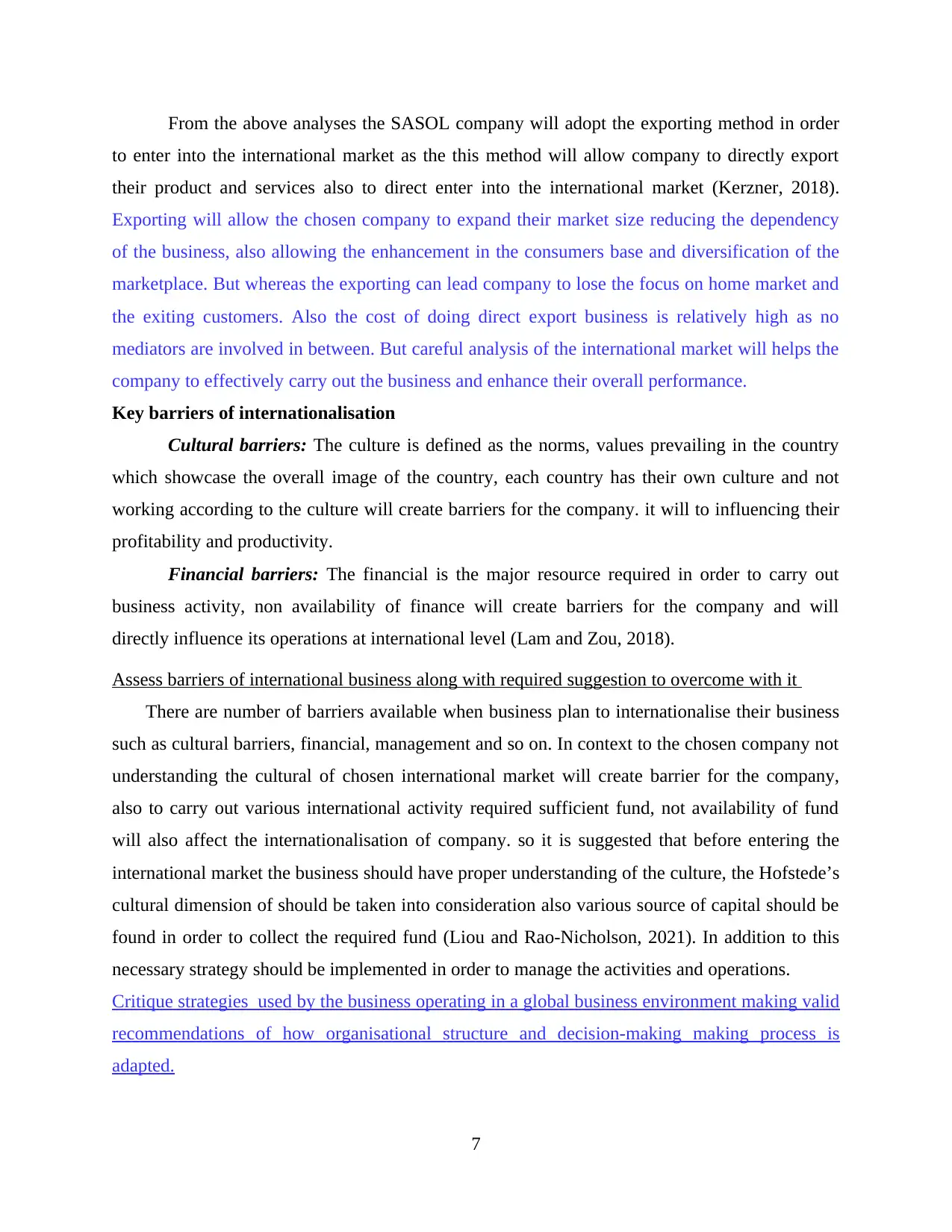
From the above analyses the SASOL company will adopt the exporting method in order
to enter into the international market as the this method will allow company to directly export
their product and services also to direct enter into the international market (Kerzner, 2018).
Exporting will allow the chosen company to expand their market size reducing the dependency
of the business, also allowing the enhancement in the consumers base and diversification of the
marketplace. But whereas the exporting can lead company to lose the focus on home market and
the exiting customers. Also the cost of doing direct export business is relatively high as no
mediators are involved in between. But careful analysis of the international market will helps the
company to effectively carry out the business and enhance their overall performance.
Key barriers of internationalisation
Cultural barriers: The culture is defined as the norms, values prevailing in the country
which showcase the overall image of the country, each country has their own culture and not
working according to the culture will create barriers for the company. it will to influencing their
profitability and productivity.
Financial barriers: The financial is the major resource required in order to carry out
business activity, non availability of finance will create barriers for the company and will
directly influence its operations at international level (Lam and Zou, 2018).
Assess barriers of international business along with required suggestion to overcome with it
There are number of barriers available when business plan to internationalise their business
such as cultural barriers, financial, management and so on. In context to the chosen company not
understanding the cultural of chosen international market will create barrier for the company,
also to carry out various international activity required sufficient fund, not availability of fund
will also affect the internationalisation of company. so it is suggested that before entering the
international market the business should have proper understanding of the culture, the Hofstede’s
cultural dimension of should be taken into consideration also various source of capital should be
found in order to collect the required fund (Liou and Rao-Nicholson, 2021). In addition to this
necessary strategy should be implemented in order to manage the activities and operations.
Critique strategies used by the business operating in a global business environment making valid
recommendations of how organisational structure and decision-making making process is
adapted.
7
to enter into the international market as the this method will allow company to directly export
their product and services also to direct enter into the international market (Kerzner, 2018).
Exporting will allow the chosen company to expand their market size reducing the dependency
of the business, also allowing the enhancement in the consumers base and diversification of the
marketplace. But whereas the exporting can lead company to lose the focus on home market and
the exiting customers. Also the cost of doing direct export business is relatively high as no
mediators are involved in between. But careful analysis of the international market will helps the
company to effectively carry out the business and enhance their overall performance.
Key barriers of internationalisation
Cultural barriers: The culture is defined as the norms, values prevailing in the country
which showcase the overall image of the country, each country has their own culture and not
working according to the culture will create barriers for the company. it will to influencing their
profitability and productivity.
Financial barriers: The financial is the major resource required in order to carry out
business activity, non availability of finance will create barriers for the company and will
directly influence its operations at international level (Lam and Zou, 2018).
Assess barriers of international business along with required suggestion to overcome with it
There are number of barriers available when business plan to internationalise their business
such as cultural barriers, financial, management and so on. In context to the chosen company not
understanding the cultural of chosen international market will create barrier for the company,
also to carry out various international activity required sufficient fund, not availability of fund
will also affect the internationalisation of company. so it is suggested that before entering the
international market the business should have proper understanding of the culture, the Hofstede’s
cultural dimension of should be taken into consideration also various source of capital should be
found in order to collect the required fund (Liou and Rao-Nicholson, 2021). In addition to this
necessary strategy should be implemented in order to manage the activities and operations.
Critique strategies used by the business operating in a global business environment making valid
recommendations of how organisational structure and decision-making making process is
adapted.
7
⊘ This is a preview!⊘
Do you want full access?
Subscribe today to unlock all pages.

Trusted by 1+ million students worldwide
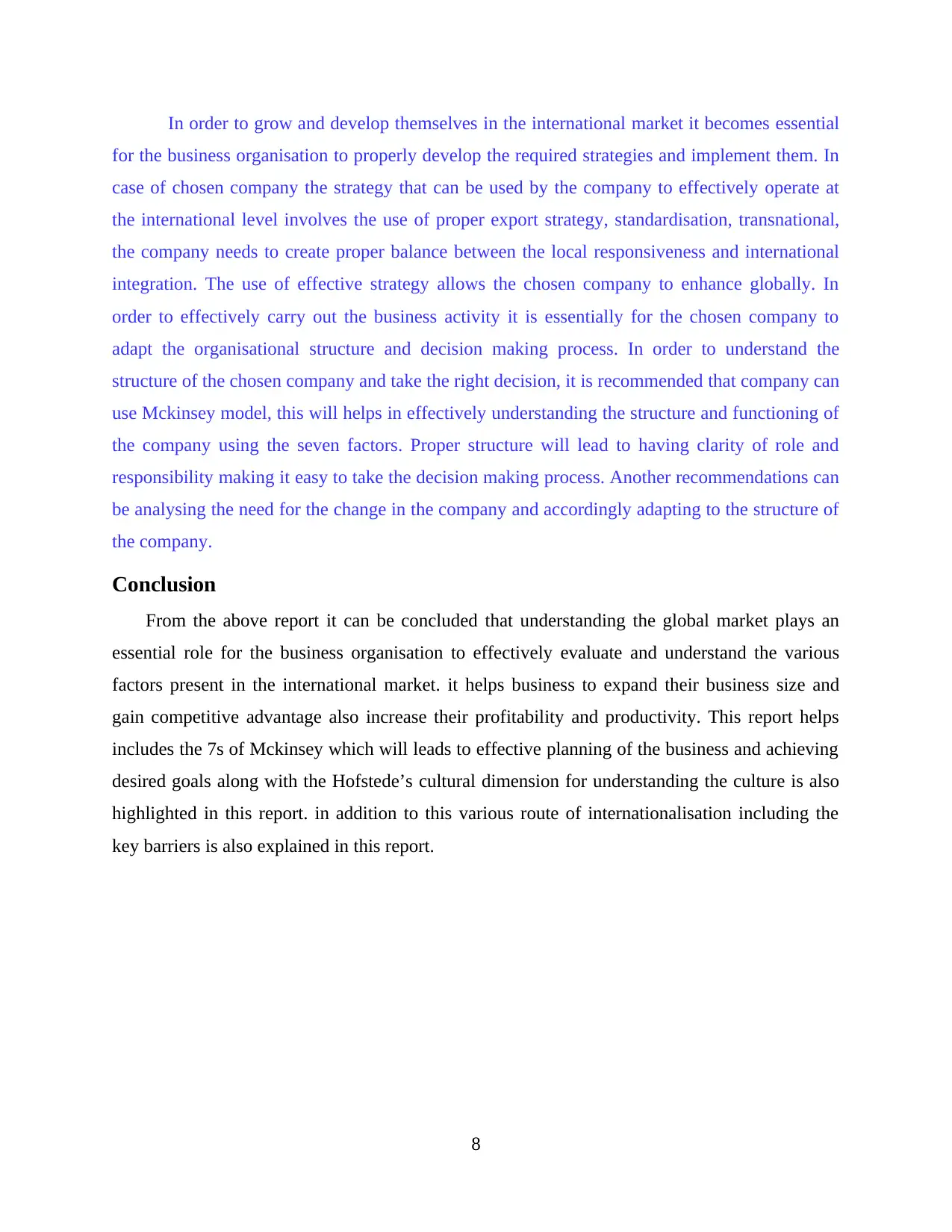
In order to grow and develop themselves in the international market it becomes essential
for the business organisation to properly develop the required strategies and implement them. In
case of chosen company the strategy that can be used by the company to effectively operate at
the international level involves the use of proper export strategy, standardisation, transnational,
the company needs to create proper balance between the local responsiveness and international
integration. The use of effective strategy allows the chosen company to enhance globally. In
order to effectively carry out the business activity it is essentially for the chosen company to
adapt the organisational structure and decision making process. In order to understand the
structure of the chosen company and take the right decision, it is recommended that company can
use Mckinsey model, this will helps in effectively understanding the structure and functioning of
the company using the seven factors. Proper structure will lead to having clarity of role and
responsibility making it easy to take the decision making process. Another recommendations can
be analysing the need for the change in the company and accordingly adapting to the structure of
the company.
Conclusion
From the above report it can be concluded that understanding the global market plays an
essential role for the business organisation to effectively evaluate and understand the various
factors present in the international market. it helps business to expand their business size and
gain competitive advantage also increase their profitability and productivity. This report helps
includes the 7s of Mckinsey which will leads to effective planning of the business and achieving
desired goals along with the Hofstede’s cultural dimension for understanding the culture is also
highlighted in this report. in addition to this various route of internationalisation including the
key barriers is also explained in this report.
8
for the business organisation to properly develop the required strategies and implement them. In
case of chosen company the strategy that can be used by the company to effectively operate at
the international level involves the use of proper export strategy, standardisation, transnational,
the company needs to create proper balance between the local responsiveness and international
integration. The use of effective strategy allows the chosen company to enhance globally. In
order to effectively carry out the business activity it is essentially for the chosen company to
adapt the organisational structure and decision making process. In order to understand the
structure of the chosen company and take the right decision, it is recommended that company can
use Mckinsey model, this will helps in effectively understanding the structure and functioning of
the company using the seven factors. Proper structure will lead to having clarity of role and
responsibility making it easy to take the decision making process. Another recommendations can
be analysing the need for the change in the company and accordingly adapting to the structure of
the company.
Conclusion
From the above report it can be concluded that understanding the global market plays an
essential role for the business organisation to effectively evaluate and understand the various
factors present in the international market. it helps business to expand their business size and
gain competitive advantage also increase their profitability and productivity. This report helps
includes the 7s of Mckinsey which will leads to effective planning of the business and achieving
desired goals along with the Hofstede’s cultural dimension for understanding the culture is also
highlighted in this report. in addition to this various route of internationalisation including the
key barriers is also explained in this report.
8
Paraphrase This Document
Need a fresh take? Get an instant paraphrase of this document with our AI Paraphraser
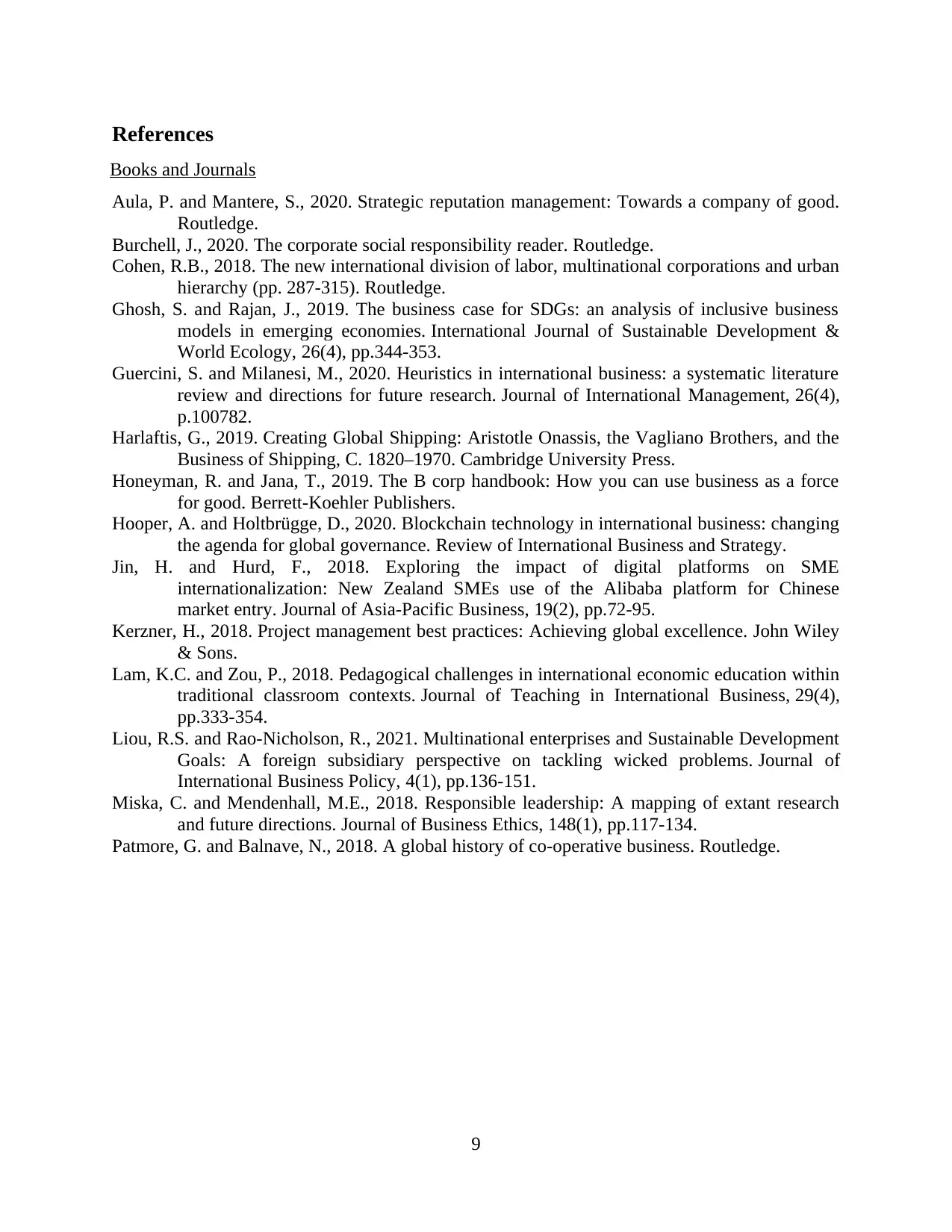
References
Books and Journals
Aula, P. and Mantere, S., 2020. Strategic reputation management: Towards a company of good.
Routledge.
Burchell, J., 2020. The corporate social responsibility reader. Routledge.
Cohen, R.B., 2018. The new international division of labor, multinational corporations and urban
hierarchy (pp. 287-315). Routledge.
Ghosh, S. and Rajan, J., 2019. The business case for SDGs: an analysis of inclusive business
models in emerging economies. International Journal of Sustainable Development &
World Ecology, 26(4), pp.344-353.
Guercini, S. and Milanesi, M., 2020. Heuristics in international business: a systematic literature
review and directions for future research. Journal of International Management, 26(4),
p.100782.
Harlaftis, G., 2019. Creating Global Shipping: Aristotle Onassis, the Vagliano Brothers, and the
Business of Shipping, C. 1820–1970. Cambridge University Press.
Honeyman, R. and Jana, T., 2019. The B corp handbook: How you can use business as a force
for good. Berrett-Koehler Publishers.
Hooper, A. and Holtbrügge, D., 2020. Blockchain technology in international business: changing
the agenda for global governance. Review of International Business and Strategy.
Jin, H. and Hurd, F., 2018. Exploring the impact of digital platforms on SME
internationalization: New Zealand SMEs use of the Alibaba platform for Chinese
market entry. Journal of Asia-Pacific Business, 19(2), pp.72-95.
Kerzner, H., 2018. Project management best practices: Achieving global excellence. John Wiley
& Sons.
Lam, K.C. and Zou, P., 2018. Pedagogical challenges in international economic education within
traditional classroom contexts. Journal of Teaching in International Business, 29(4),
pp.333-354.
Liou, R.S. and Rao-Nicholson, R., 2021. Multinational enterprises and Sustainable Development
Goals: A foreign subsidiary perspective on tackling wicked problems. Journal of
International Business Policy, 4(1), pp.136-151.
Miska, C. and Mendenhall, M.E., 2018. Responsible leadership: A mapping of extant research
and future directions. Journal of Business Ethics, 148(1), pp.117-134.
Patmore, G. and Balnave, N., 2018. A global history of co-operative business. Routledge.
9
Books and Journals
Aula, P. and Mantere, S., 2020. Strategic reputation management: Towards a company of good.
Routledge.
Burchell, J., 2020. The corporate social responsibility reader. Routledge.
Cohen, R.B., 2018. The new international division of labor, multinational corporations and urban
hierarchy (pp. 287-315). Routledge.
Ghosh, S. and Rajan, J., 2019. The business case for SDGs: an analysis of inclusive business
models in emerging economies. International Journal of Sustainable Development &
World Ecology, 26(4), pp.344-353.
Guercini, S. and Milanesi, M., 2020. Heuristics in international business: a systematic literature
review and directions for future research. Journal of International Management, 26(4),
p.100782.
Harlaftis, G., 2019. Creating Global Shipping: Aristotle Onassis, the Vagliano Brothers, and the
Business of Shipping, C. 1820–1970. Cambridge University Press.
Honeyman, R. and Jana, T., 2019. The B corp handbook: How you can use business as a force
for good. Berrett-Koehler Publishers.
Hooper, A. and Holtbrügge, D., 2020. Blockchain technology in international business: changing
the agenda for global governance. Review of International Business and Strategy.
Jin, H. and Hurd, F., 2018. Exploring the impact of digital platforms on SME
internationalization: New Zealand SMEs use of the Alibaba platform for Chinese
market entry. Journal of Asia-Pacific Business, 19(2), pp.72-95.
Kerzner, H., 2018. Project management best practices: Achieving global excellence. John Wiley
& Sons.
Lam, K.C. and Zou, P., 2018. Pedagogical challenges in international economic education within
traditional classroom contexts. Journal of Teaching in International Business, 29(4),
pp.333-354.
Liou, R.S. and Rao-Nicholson, R., 2021. Multinational enterprises and Sustainable Development
Goals: A foreign subsidiary perspective on tackling wicked problems. Journal of
International Business Policy, 4(1), pp.136-151.
Miska, C. and Mendenhall, M.E., 2018. Responsible leadership: A mapping of extant research
and future directions. Journal of Business Ethics, 148(1), pp.117-134.
Patmore, G. and Balnave, N., 2018. A global history of co-operative business. Routledge.
9
1 out of 11
Related Documents
Your All-in-One AI-Powered Toolkit for Academic Success.
+13062052269
info@desklib.com
Available 24*7 on WhatsApp / Email
![[object Object]](/_next/static/media/star-bottom.7253800d.svg)
Unlock your academic potential
Copyright © 2020–2026 A2Z Services. All Rights Reserved. Developed and managed by ZUCOL.





